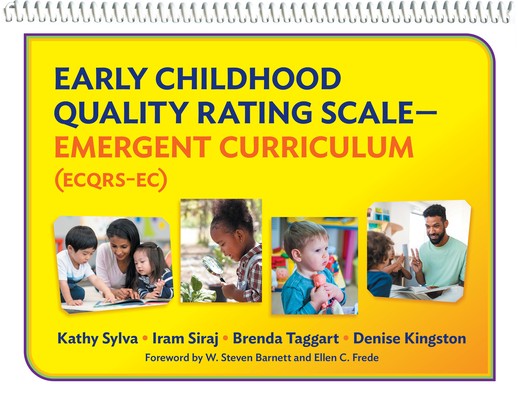
- We will send in 10–14 business days.
- Author: Kathy Sylva
- Publisher: Teachers College Press
- ISBN-10: 0807786551
- ISBN-13: 9780807786550
- Format: 21.7 x 27.8 x 0.6 cm
- Language: English
- SAVE -10% with code: EXTRA
Early Childhood Quality Rating Scale--Emergent Curriculum (Ecqrs-Ec) (e-book) (used book) | bookbook.eu
Reviews
Description
Young children's learning depends on a wide range of experiences that support their holistic development. While many different curricular frameworks are used around the world, there is increasing agreement that the emerging academic skills of language and literacy, mathematics, and science should be supported by a playful pedagogy in the early years. The Early Childhood Quality Rating Scale--Emergent Curriculum (ECQRS-EC) is designed to measure quality in these key areas within preschool settings. The ECQRS-EC substantially updates the Early Childhood Environment Rating Scale Extension (ECERS-E, 2010), which was the first observational quality scale to focus directly on the development of emergent academic skills. In addition to three content-area subscales, this evidence-based tool includes a subscale dedicated to diversity and inclusion to help educators support gender and cultural differences in children 3-6 years old who are developing at different rates. Because it recognizes the important role of the adult in providing children with high-quality interactions, this new quality rating scale can be used for research, teacher self-evaluation, and program improvement, audit, and regulation.
Book Features:
- Focuses on the role of the early childhood educator, their pedagogy, and planning.
- Items are firmly grounded in culturally and developmentally appropriate practice.
- Diversity Subscale, "Supporting Diversity and Inclusion," reflects the importance of sensitivity to supporting special needs and being inclusive of all cultures, including Indigenous people.
EXTRA 10 % discount with code: EXTRA
The promotion ends in 21d.06:26:25
The discount code is valid when purchasing from 10 €. Discounts do not stack.
- Author: Kathy Sylva
- Publisher: Teachers College Press
- ISBN-10: 0807786551
- ISBN-13: 9780807786550
- Format: 21.7 x 27.8 x 0.6 cm
- Language: English English
Young children's learning depends on a wide range of experiences that support their holistic development. While many different curricular frameworks are used around the world, there is increasing agreement that the emerging academic skills of language and literacy, mathematics, and science should be supported by a playful pedagogy in the early years. The Early Childhood Quality Rating Scale--Emergent Curriculum (ECQRS-EC) is designed to measure quality in these key areas within preschool settings. The ECQRS-EC substantially updates the Early Childhood Environment Rating Scale Extension (ECERS-E, 2010), which was the first observational quality scale to focus directly on the development of emergent academic skills. In addition to three content-area subscales, this evidence-based tool includes a subscale dedicated to diversity and inclusion to help educators support gender and cultural differences in children 3-6 years old who are developing at different rates. Because it recognizes the important role of the adult in providing children with high-quality interactions, this new quality rating scale can be used for research, teacher self-evaluation, and program improvement, audit, and regulation.
Book Features:
- Focuses on the role of the early childhood educator, their pedagogy, and planning.
- Items are firmly grounded in culturally and developmentally appropriate practice.
- Diversity Subscale, "Supporting Diversity and Inclusion," reflects the importance of sensitivity to supporting special needs and being inclusive of all cultures, including Indigenous people.


Reviews